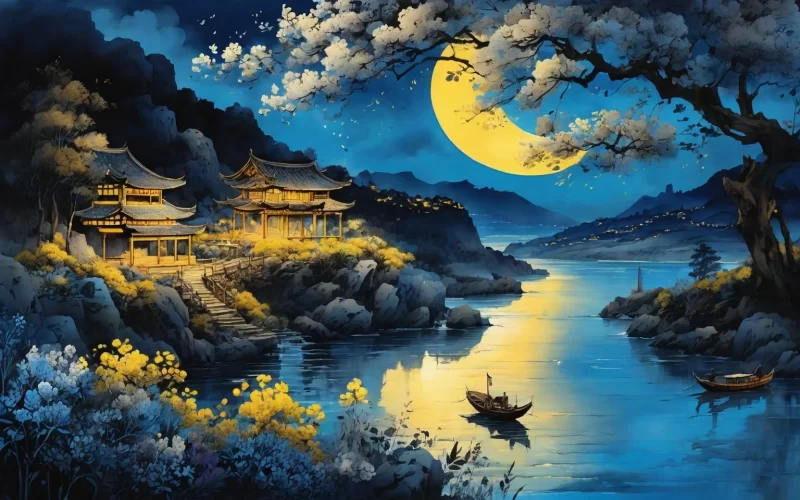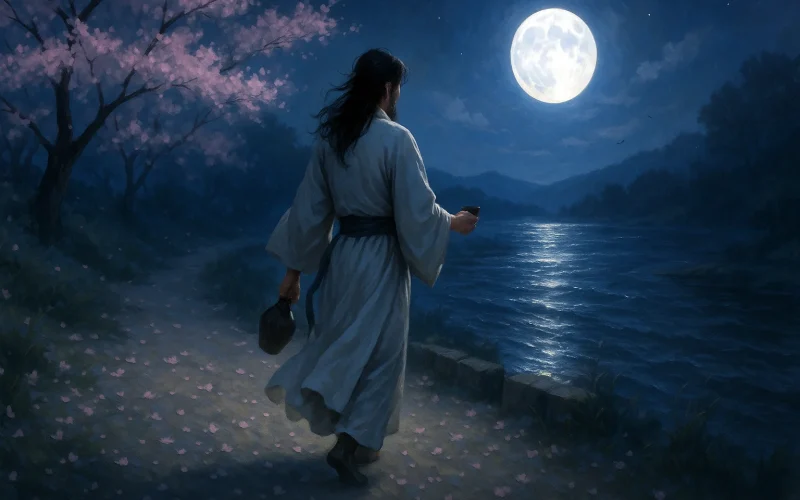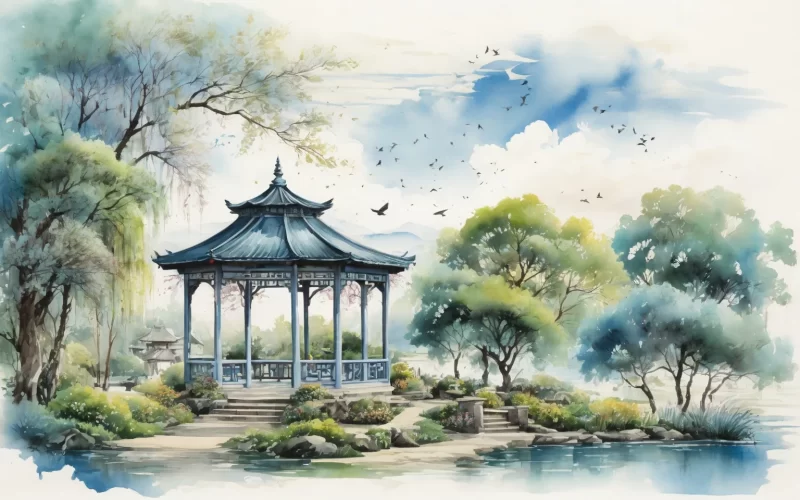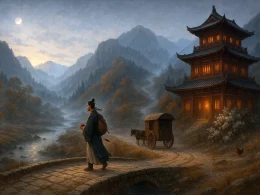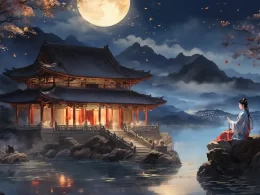My boat sails down to the Riverside Town,
I see the Conqueror’s Pavilion steeped in moonlight.
The flowers on the hills like maidens’ faces look down;
The lamps on the stream like fireflies bright.
Original Poem
「夜下征虏亭」
李白
船下广陵去,月明征虏亭。
山花如绣颊,江火似流萤。
Interpretation
This work captures Li Bai's nighttime journey along the Yangtze River from Zhenglu Pavilion (near modern Nanjing) to Guangling (present-day Yangzhou). The poet observes the riverscape under moonlight, blending natural imagery with subtle emotion to create a vivid nocturnal tableau.
First Couplet: "船下广陵去,月明征虏亭。"
Chuán xià Guǎnglíng qù, yuè míng Zhēnglǔ tíng.
The boat descends toward Guangling; The moon illuminates Zhenglu Pavilion.
The opening lines establish the journey's direction and setting. The pavilion, bathed in clear moonlight, symbolizes both the beauty of the night and the poet's contemplative gaze backward as he travels eastward.
Second Couplet: "山花如绣颊,江火似流萤。"
Shān huā rú xiù jiá, jiāng huǒ sì liú yíng.
Mountain flowers blush like adorned cheeks; River lights flicker like fireflies.
The poet employs striking figurative language: mountain blossoms are compared to the rouged cheeks of Tang dynasty women, suggesting delicate beauty, while lights on the water evoke the dance of fireflies, creating a dreamlike atmosphere along the river.
Holistic Appreciation
This poem presents a dynamic yet serene riverside night scene characteristic of Jiangnan's waterways. Li Bai masterfully integrates the moving boat, moonlit pavilion, mountain flowers, and river lights into a layered composition that is both ethereal and tangible.
The initial couplet outlines the physical journey while establishing a tranquil nocturnal mood. The subsequent lines shift to visual details, using imaginative comparisons to animate the scenery—flowers take on human qualities, while lights acquire organic movement. This transformation of static observation into lively perception demonstrates the poet's unique ability to find vitality in darkness.
Though ostensibly descriptive, the poem carries undertones of transience. The poet passes a place where others once lingered, acknowledging beauty that cannot be held. This subtle melancholy lingers beneath the surface of the vivid imagery.
Artistic Merits
- Balanced Structure, Rhythmic Flow: The parallel couplets create a harmonious cadence that enhances recitation.
- Vivid Imagery, Evocative Comparisons: The metaphorical language gives natural elements emotional resonance without excessive ornamentation.
- Scene-Emotion Integration: The description of the nightscape quietly conveys the poet's contemplative mood.
Insights
This poem not only reveals the captivating beauty of the night but also conveys a poetic attitude toward life. It reminds us to appreciate the scenery around us and embrace the tranquility and romance bestowed by nature. In today's fast-paced world, we are often too preoccupied with our pursuits to notice the beauty surrounding us. The poet, traveling by boat at night, remains acutely attentive to the shifting scenes of the river moon, mountain blossoms, and fishing lights—such sensitivity to beauty is something we can learn from.
Moreover, this poem invites us to reflect on the flow of life. Just as the poet journeys along the river by night, life, too, is a passage where we encounter different vistas at different stages. Those beautiful moments may become the warmest fragments of our future memories. Therefore, we should cherish the present, slow down our pace, and savor the small wonders of daily life, allowing our hearts to find poetic resonance and inner calm amid the busyness.
About the poet

Li Bai (李白), 701 - 762 A.D., whose ancestral home was in Gansu, was preceded by Li Guang, a general of the Han Dynasty. Tang poetry is one of the brightest constellations in the history of Chinese literature, and one of the brightest stars is Li Bai.






